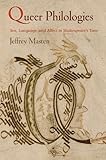Queer Philologies : Sex, Language, and Affect in Shakespeare's Time / Jeffrey Masten.
Material type: TextSeries: Material TextsPublisher: Philadelphia : University of Pennsylvania Press, [2016]Copyright date: ©2016Description: 1 online resource (368 p.) : 51 illusContent type:
TextSeries: Material TextsPublisher: Philadelphia : University of Pennsylvania Press, [2016]Copyright date: ©2016Description: 1 online resource (368 p.) : 51 illusContent type: - 9780812293173
- English literature -- Early modern, 1500-1700 -- History and criticism
- Homosexuality and literature -- England -- History -- 16th century
- Language and sex -- England -- History -- 16th century
- Language and sex -- England -- History -- 17th century
- LITERARY CRITICISM / Shakespeare
- Cultural Studies
- Literature
- 820.9/003 23
- PR428.H66
- online - DeGruyter
| Item type | Current library | Call number | URL | Status | Notes | Barcode | |
|---|---|---|---|---|---|---|---|
 eBook
eBook
|
Biblioteca "Angelicum" Pont. Univ. S.Tommaso d'Aquino Nuvola online | online - DeGruyter (Browse shelf(Opens below)) | Online access | Not for loan (Accesso limitato) | Accesso per gli utenti autorizzati / Access for authorized users | (dgr)9780812293173 |
Frontmatter -- Contents (A) -- Contents (Q) -- Note on Citations and Quotations -- Introduction. On Q: An Introduction to Queer Philology -- Chapter 1. Spelling Shakespeare: Early Modern “Orthography” and the Secret Lives of Shakespeare’s Compositors -- Lexicon 1. Friendship -- Chapter 2. “Sweet Persuasion,” the Taste of Letters, and Male Friendship -- Chapter 3. Extended “Conversation”: Living with Christopher Marlowe; a Brief History of “Intercourse” -- Lexicon 2. Boy-Desire -- Chapter 4. Reading “Boys”: Performance and Print -- Chapter 5. “Amorous Leander,” Boy-desire, Gay Shame; Or, Straightening Out Christopher Marlowe -- Lexicon 3. Sodomy -- Chapter 6. Is the Fundament a Grave? Translating the Early Modern Body -- Chapter 7. When Genres Breed: “Mongrell Tragicomedie” and Queer Kinship -- Editing Philologies -- Chapter 8. All Is Not Glossed: Editing Sex, Race, Gender, and Affect in Shakespeare -- Chapter 9. More or Less Queer: Female “Bumbast” in Sir Thomas More -- Notes -- Bibliography -- Index -- Acknowledgments
restricted access online access with authorization star
http://purl.org/coar/access_right/c_16ec
For Jeffrey Masten, the history of sexuality and the history of language are intimately related. In Queer Philologies, he studies particular terms that illuminate the history of sexuality in Shakespeare's time and analyzes the methods we have used to study sex and gender in literary and cultural history. Building on the work of theorists and historians who have, following Foucault, investigated the importance of words like "homosexual," "sodomy," and "tribade" in a variety of cultures and historical periods, Masten argues that just as the history of sexuality requires the history of language, so too does philology, "the love of the word," require the analytical lens provided by the study of sexuality.Masten unpacks the etymology, circulation, transformation, and constitutive power of key words within the early modern discourse of sex and gender—terms such as "conversation" and "intercourse," "fundament" and "foundation," "friend" and "boy"—that described bodies, pleasures, emotions, sexual acts, even (to the extent possible in this period) sexual identities. Analyzing the continuities as well as differences between Shakespeare's language and our own, he offers up a queer lexicon in which the letter "Q" is perhaps the queerest character of all.
Mode of access: Internet via World Wide Web.
In English.
Description based on online resource; title from PDF title page (publisher's Web site, viewed 24. Aug 2021)


